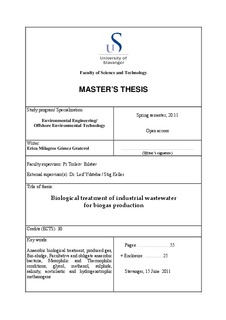| dc.contributor.author | Gomez, Erica M. | |
| dc.date.accessioned | 2011-10-05T11:14:53Z | |
| dc.date.available | 2011-10-05T11:14:53Z | |
| dc.date.issued | 2011 | |
| dc.identifier.uri | http://hdl.handle.net/11250/182446 | |
| dc.description | Master's thesis in Environmental technology | en_US |
| dc.description.abstract | Anaerobic biodegradation is a method of degradation that converts approximately 90% of the available chemical energy (in the form of organic material), into gas methane. Apart from the economic value of the methane gas produced, anaerobic treatment has many advantages over traditional aerobic treatment processes, such as less biomass produced per unit of substrate utilized; higher organic loadings are possible as anaerobic processes are not limited by oxygen transfer rates, and the lower constructional and operational costs compared with aerobic processes.
Since anaerobic biodegradation is an attractive waste treatment practice, industrial wastewaters from the oil and gas industry, typically known as “produced water” are ideal candidates for anaerobic digestion if they contain high levels of easily biodegradable materials. That is the case of the produced water from the gas field “Sleipner”, which contains high concentration of methanol and glycol, substrates in theory easily biodegradable. However, process instability can be produced in anaerobic system, since it is a system where various groups of microorganisms operate and have different physiology, nutritional needs, growth kinetics, and sensitivity to environmental conditions.
Through the installation and follow-up of a bioreactor in Laboratory, it was possible to demonstrate that it is possible to treat the produced water from Sleipner anaerobically. As evidence of this, some COD removal and produced gas were reported.
Difficulties on keeping the stability of the system occurred during the experimentation, especially when increasing organic loading rate. Some important parameters that required a better control during the experimentation were: buffering system capacity and residence time. | en_US |
| dc.description.sponsorship | Nature Technology Solutions (NTS) | en_US |
| dc.language.iso | eng | en_US |
| dc.publisher | University of Stavanger, Norway | en_US |
| dc.relation.ispartofseries | Masteroppgave/UIS-TN-IMN/2011; | |
| dc.subject | biogas | en_US |
| dc.subject | anaerobic biodegradation | en_US |
| dc.subject | produced water | en_US |
| dc.subject | methanogenic microorganisms | en_US |
| dc.subject | glycol biodegradation | en_US |
| dc.subject | methanol biodegradation | en_US |
| dc.subject | biosludge | en_US |
| dc.subject | biological treatment | en_US |
| dc.subject | teknisk miljøvern | en_US |
| dc.subject | offshore teknologi | en_US |
| dc.title | Biological treatment of industrial wastewater for biogas production | en_US |
| dc.type | Master thesis | en_US |
| dc.subject.nsi | VDP::Technology: 500::Marine technology: 580::Offshore technology: 581 | en_US |
| dc.subject.nsi | VDP::Technology: 500::Environmental engineering: 610 | en_US |
